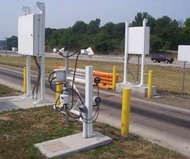8/24/2012
Federal Agencies Trade Motorist Data to Insurance CompaniesDepartment of Homeland Security agrees to track motorists using a database built by the insurance industry.

Federal agencies are giving away data on the movements of innocent motorists in return for software and equipment provided by the insurance industry. The Electronic Privacy Information Center (EPIC) on Tuesday released documents revealing in greater detail how federal agencies are using the data collected by automated license plate recognition systems (ALPR or ANPR in Europe). These devices are use cameras and computer algorithms to create an history of where people drive, and when. As first reported in Forbes, the new EPIC documents show the data generated by the cameras are being handed over to private insurance firms.
EPIC and the American Civil Liberties Union (ACLU) have been hitting government agencies with freedom of information requests regarding the use of license plate readers. Until now, the public has been kept in the dark about how their driving history is being used, or lead to believe the cameras would only be used to find specific, targeted vehicles on a "hot list" of stolen cars. Instead, the systems are building a history of the movements of people who have done nothing wrong.
"Our worst fears about license plate recognition technology appear to be unfolding," wrote Kade Crockford, Director of the Technology for Liberty Project of the ACLU of Massachusetts. "The government is creating large pools of our location information and sharing it widely among law enforcement agencies nationwide, absent any mention of connections to investigations or criminal activity."
The documents show the Drug Enforcement Agency and Customs and Border Protection (CBP) signed a memorandum of understanding authorizing the sharing of license plate reader data. This means tracking information on motorists who drive through border checkpoints -- many of which are located on travel routes far from the actual border -- are shared with DEA agents. The information will be further spread to "intelligence, operations and fusion centers" as well as state and local law enforcement, as desired. The data is stored for two years, unless transferred to another system with a longer data retention policy.
In November 2005, Customs and Border Protection also entered into an agreement with the National Insurance Crime Bureau (NICB), which is an organization of nearly every insurance firm in the country. The stated purpose is to prevent the export of stolen motor vehicles. The border agency agreed to "make available to NICB electronic LPR information on vehicles leaving or entering the United States." In return, NICB agreed to create a database containing all of the license plate information.
"NICB agrees to procure the equipment, software and programming resources necessary to develop the capability to utilize, refine and organize the information provided by CBP," the memorandum stated.
With CBP approval, the data entry, database and other operational work could be outsourced to third-party firms.


